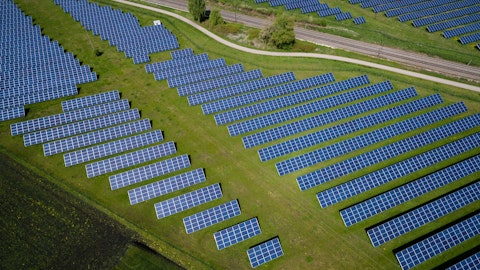So we see all of them down, whether there are installers going out of business. We don’t get that information, but I think we don’t have that data. We don’t see the same trend, which is loans moving to leases. All our partners are pretty great. Sunnova, Sunpower, Sunrun, for us, it is moving from one hand to another hand like what I said. That’s the color I can give you.
Unidentified Analyst: That’s very helpful. And then just any sense on Texas and Florida, in particular. I know outside California is averaging a little better, but maybe specifically those markets?
Badri Kothandaraman: Yes. I mean they were disproportionately down because of — because the utility rates aren’t as high compared to the increase in the interest rates. So they were worst affected, but we see many of them in Texas and California. I mean, Texas and Florida particularly moving to the lease model. We do see that like what you said. And we do see that business starting to recover.
Unidentified Analyst: Thank you.
Operator: And our next question will come from Joseph Osha with Guggenheim Partners. Please go ahead.
Joseph Osha: Hey thanks for fitting me in. Badri, appreciate it. Two questions. First, following on from the previous one, look, we all see Sunrun, Sunnova, Sunpower accessing ADS or whatever markets for third-party ownership. I’m curious, do you know if your long tail has found any other solutions for third-party ownership? Or when you talk about that avenue, is it basically those third companies that you’re seeing? And I do have one other question.
Badri Kothandaraman: Majority is those companies, and there are a few smaller leasing companies that are coming up, too. But 90% is those three companies.
Joseph Osha: Okay. Great. And then this is really more of a philosophical question. I know all of us on Wall Street just love to hear you talk about defending your gross margin. But given how the market is evolving, have you done some analysis and are you sure that your business couldn’t perhaps generate higher bottom line earnings if you simply grew it more quickly and allow, say, a 35% gross margin. I’m just curious as to your philosophy as to why the gross margin has to stay where it is.
Badri Kothandaraman: It is the eternal question. Can I grow faster if I drop prices, right? I mean for us, it is pricing based on value. The moment we’ve stopped generating value, it is over. So that’s why I never look at those in conjunction pricing. I don’t base it on cost. The moment you base it on cost, it’s the problem. Then you forget about the value drivers. And therefore, the — what that means is if we need to add value in both microinverters and battery and software. And that’s hard to do, but that’s what we do thoroughly. Innovation is — someone said it right in Silicon Valley, innovate or die. We are that company. That’s our philosophy. So we believe high quality is high volume and high price or the right prices or value.
Joseph Osha: Okay, thank you. Appreciate that.
Operator: And our next question will come from Vikram Bagri with Citigroup. Please go ahead.
Vikram Bagri: Good evening everyone. Very helpful color on demand and supply dynamic in countries in Europe. Badri, you mentioned you expect to recover a bit in your calculation of $300 million of inventory reductions over the next two quarters? Is that rebound? Is that a function of Enphase entering a number of new countries in EU this year, as you mentioned, and gaining market share in existing markets, such as Germany, or the outlook for inventory reductions assumes that the base demand rebounds in first quarter. And on top of that, you gained market share in new as well as sort of like existing markets. And then if you can talk about the U.S. market also, it seems like you’re looking to defend market share. You haven’t seen any declines in market share so far. But if there were some, you will look to defend that.
Badri Kothandaraman: Yes. I mean we already told you that we aren’t assuming the demand picture changing from the current levels in our assumptions. And basically, I’m not here to give guidance for Q1, but I’m just giving you a general color for Q1. So all our resumptions are based on demand picture not changing in the next — demand picture not changing from where it is today. So that’s what we said in our assumptions. Then your question is on U.S. U.S. for us is — we work with a lot of customers. We — this is the time where our partnerships like what I said, are a lot deeper. Every one of our executives is always on the road visiting customers. Every opportunity to gain market share, we are all over it. And like what I said, we have a number of tools.
Yes, of course, it’s defending against competition. All competition is very important for us. We take everybody seriously. We work on our problems. We fix our problems, our customer service, you see many people in place stick to us for our quality and customer experience. Our Net Promoter Score is 78 in the U.S. We are opened 24/7, our call center. We have field service technicians who will show up in your home tomorrow if you have a problem today, right? So we have a — if you put the total picture together, its innovation, quality and customer experience. Now we have one more fact that we have. We can give people a made-in-America products. Now we do have that many of our installers love it because they — for example, we just had — in Flex, we in South Carolina, President Biden and came and inaugurated that plant, and we have a lot of installers there, including not just installer partners, distribution partners.
So it is very important for them. Made in America product right there in South Carolina, right there in Arlington, right? They’re in Wisconsin. It is there. So we think that will help too. And we are going to — in a similar vein, we’re going to bring in our batteries as well in the U.S., and we will take advantage of the domestic content there. And so that will provide extra help to some of our leasing partners. So yes, we are always working on market share. We always take competition seriously, not just right now. This is how we do business.





